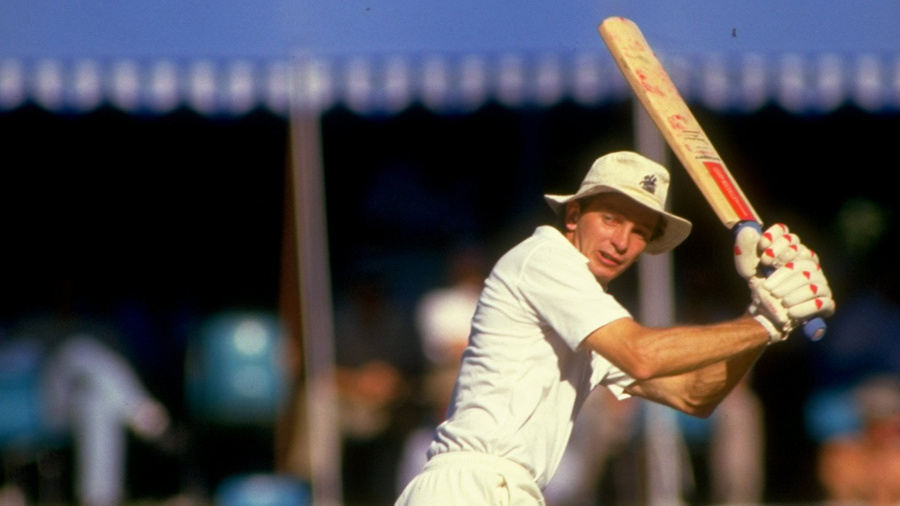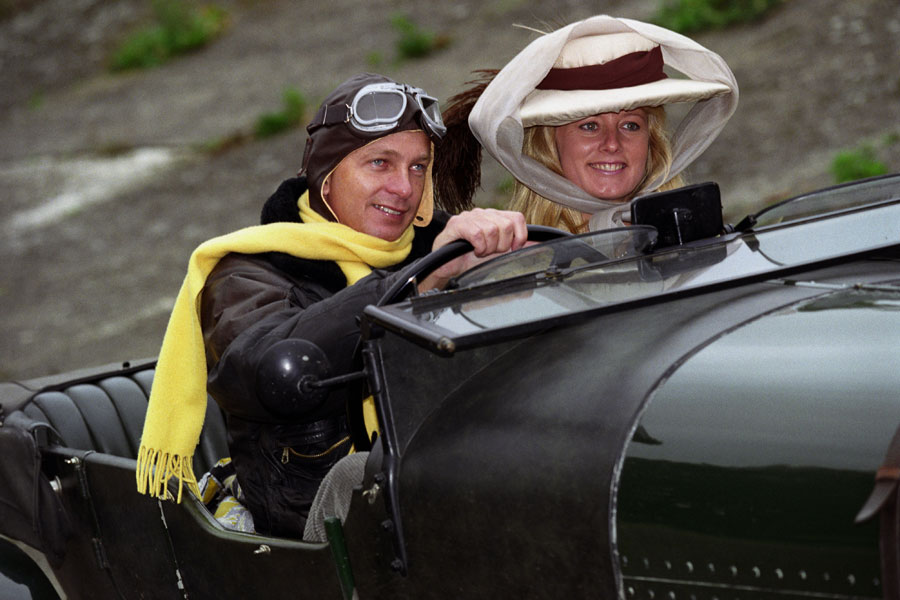Rob Steen in Cricinfo
Exquisitely flawless, the former England captain was the Rembrandt of batting: all touch, timing and subtle depth; and never better than 30 years ago
 David Gower: poise, fragility and ineffable beauty © Getty Images
David Gower: poise, fragility and ineffable beauty © Getty Images"I found it strange that the 2005 team all found themselves with MBEs in the next Honours List. If I had been given an award every time England won the Ashes during my career, I would be in the House of Lords."
Tongue may have been caressing cheek with customary aplomb, but that isn't the sort of sound bite one associates with David Gower, being largely bereft of understatement and peppered with self-assertiveness. You can find it in Sex & Drugs & Rebel Tours, Dave Tossell's latest erudite, immaculately titled romp through the occasional ups and persistently numbing downs of Team England over the final quarter of the 20th century, a gruelling, gripping, excruciating slice of comical, angst-ridden soap opera - call it tailenders - that proved a handy weapon in the bitterly unscrupulous tabloid circulation wars.
David Ivon Gower doesn't do snide. Nor does he do haughty or sneery. Everything he did with a bat in his hands oozed natural elegance; honed through thousands of net hours at King's School Canterbury but still an extension of self. No world-class athlete this column has ever met has tried less to impress, or been so self-effacing, or rubbed so few up the wrong way. No sporting hero turned commentary-boxer has spent less time recounting past glories or waxing nostalgic. And no competitive artist has better embodied the spirit of that fabulous (if possibly mythical) Cary Grant one-liner: "Everyone wants to be Cary Grant - even I want to be Cary Grant."
Is there any more fitting coincidence than the fact that Gower rhymes not only with flower but power? On this topic more than any other, frankly, this column is resolutely and hopelessly myopic. Its adoration is so ardent that it agreed to be Gower's first biographer, even though a giggle-a-page autobiography, expertly ghosted by his soul brother Martin Johnson, had already sold by the juggernaut.
Two years later, less fortunately for subject than author, there was more to say. Hounded into premature retirement by those who vindicate Charlie Skinner's acidic adage in The Newsroom- "Hell hath no fury like the second-rate" - Gower deserved a more robust defence as well as a less restrained celebration. The most stinging volleys of righteous abuse were saved for Graham Gooch, the captain and friend whose own career Gower had once preserved with such compassion.
Just once during a meeting at his Hampshire home did the mood dip below exceedingly pleasant - when the interviewer, anxious to temper the idolatry with some journalistic dispassion, accused him of mental laziness. Cue a rambling but sound counter theory that made it easy to understand why he had gravitated towards a legal career, even if it did find him more or less pleading guilty as charged.
Few upper lips have been sturdier. He certainly appeared far more willing to forgive Gooch than his biographer was.
****
Imagine a gallery of cricketers as artists. David Warner as Jackson Pollock - the epitome of bold subversion, Mr Couldn't Give A Toss. Pietersen as Dali: a galling, irrepressible, un-ignorable minor genius. Tendulkar as Michelangelo, all smooth lines and sacred overtones. Warne as Picasso, all new tricks and piss-takes. Murali as Van Gogh, a sorcerer, earthy and soulful. For Gower, read Rembrandt, all touch, timing and subtle depth.
Gower cast spells like no other. Whenever he was on TV, so desperate was Tim Rice, the wordsmith behind Jesus Christ Superstar, to see his idol succeed, and so fearful that he might not, that he hid behind the settee. During his illustrious reign as editor of Wisden, Matthew Engel cited Gower's 72 in Perth in 1982 as the finest knock he'd ever seen, "an exquisite, flawless diamond". Knowing Matthew as this column does, it is as certain as it can be that this was the only time he has ever uttered or written the word "flawless" and not preceded it with "not" or "hardly".
Never, though, was Gower quite so exquisitely flawless as he was 30 summers ago. That the memories still glow can be attributed in good part to the fact that we sporty Poms were in such dire need of reasons to be cheerful. May 1985 had scored a horrifying hat-trick.
On the 11th, a blaze erupted in a wooden stand at Bradford City's Valley Parade, killing 56 spectators; many Yorkshiremen still blame the club's late owner for arson - a series of such "accidents" had befallen a number of his other business concerns - but the roots of the tragedy were embedded in the national game's contempt for its customers. At Wembley a week later, Manchester United's Kevin Moran become the first player to be sent off in an FA Cup final, for a so-called "professional foul", denying Everton a likely lead that would have decided the game in the regulation 90 minutes; Norman Whiteside's perversely wondrous extra-time strike ensured the sinner emerged a victor. Then, 11 days later, came the nadir of f***ball hooliganism, aka "the English disease": at a dilapidated stadium in Belgium, blatantly unfit for purpose, a horde of boozed-up Liverpool fans charged their Juventus counterparts, a wall collapsed and 39 died.
 Gower, seen here with wife Thorunn, was at his mesmerising best against the Australians in 1985 © PA Photos
Gower, seen here with wife Thorunn, was at his mesmerising best against the Australians in 1985 © PA PhotosSummer brought balm. Not only did England reclaim the Ashes, they did so with style and vigour. Best of all, the man who sheepishly hoisted the replica urn between right thumb and forefinger on the Oval balcony harvested 732 runs - still the most by an England captain in a series against Australia, not to mention the most by any Pom in an Ashes debate at home. The second movie this column ever saw was Summer Magic, a Disneyfied yarn whose allure lay wholly in another blonde bombshell, Hayley Mills; here, more than two decades later, was the sequel. Vince Lombardi could go to hell: good guys really could come first.
Tanya Aldred was luckier than most: she broke her cricketing virginity that heady, often dizzying summer. "Delicate David - my father's hero became his children's hero too," she reflected in The New Ball Volume 4. "His batting was of a vintage so lipsmackingly tasty that even a Formula 1 driver would be loath to spray it around. Flick of the wrist - four. Eighty-nine of them in total. Stressed-out executives should be forced to watch videos of each one, every morning before work."
Awe sprang not so much due to those innately, inexpressibly handsome strokes as the serenity and stillness at their core. Here he was, captain of his country, facing the ancient enemy, and betraying not so much as a hint of a glimmer of anxiety (it helped, admittedly, that Allan Border's party was approximately the third-puniest ever to land in England). If Bradman was the white Headley, Gower was the white Sobers, in temperament and movement if not versatility. The miracle was that he was loved by so many who would normally be infuriated by one so resistant to emotion or visible effort. The vulnerability had much to do with it; the vulnerability that comes with performing on the highest wire of excellence, forever swaying between sublime and negligent.
As if poise, fragility, humility and ineffable beauty weren't enough, Gower offered something even more precious: dignity. "At least I've had a couple of years," he said shortly after the first of his two sackings as England captain, in the wake of India's maiden Lord's Test win in 1986. To his credit, marvelled Frank Keating in the Guardian, "he has not changed a jot since the selectors appointed him two years ago. He remains a laid-back charming goldielocks with a touch of genius at the crease, no histrionics or tantrums in the field, and an ambassadorial approach to the world." Having kept Ian Botham onside and succeeded where Mike Brearley failed by getting the best from Phil Edmonds, he'd have been just the chap to keep KP inside the tent.
The key to that constancy was not the diffidence or arrogance perceived by some but that acute sense of proportion. Sure, he loved the game, the cameraderie as much as the challenges, but winning was never everything. Who else could have had the brass balls to announce to the media, after a bad day against Border's vengeful side at Lord's in 1989, that he was off to the theatre? That he returned on the Monday to make a silkily defiant century, however fruitless, spoke of a will immeasurably stronger than commonly assumed. "It felt like the captain versus the press," he recalled. "In a sense it was quite good fun."
Ultimately his greatest asset was courage. The courage not to be cowed by Dennis Lillee, Malcolm Marshall, Wasim Akram or even Fleet Street's snarliest. The courage to attack in situations calling for grim defence and sobriety. The courage - notwithstanding those early efforts at de-elocution - to be posh during the heyday of inverted snobbery. The courage to be both man apart and man out of time. The courage, above all, to stay true to himself in the face of envy and ridicule.
That's why, 30 years on from his sunniest summer, at a time when there are hardly any reasons to be cheerful about so many of the elements that allegedly made Britain great, this column feels compelled to entreat its Queen: please, ma'am, do the decent thing when you finalise next month's Birthday Honours List and send your foremost sporting ambassador a text informing him he is going to be the first Englishman to be knighted exclusively for his on-field contributions since you tapped Len Hutton on the shoulders in 1956. Having approved yet another bloody Tory government, it's the very least you owe us.
No comments:
Post a Comment